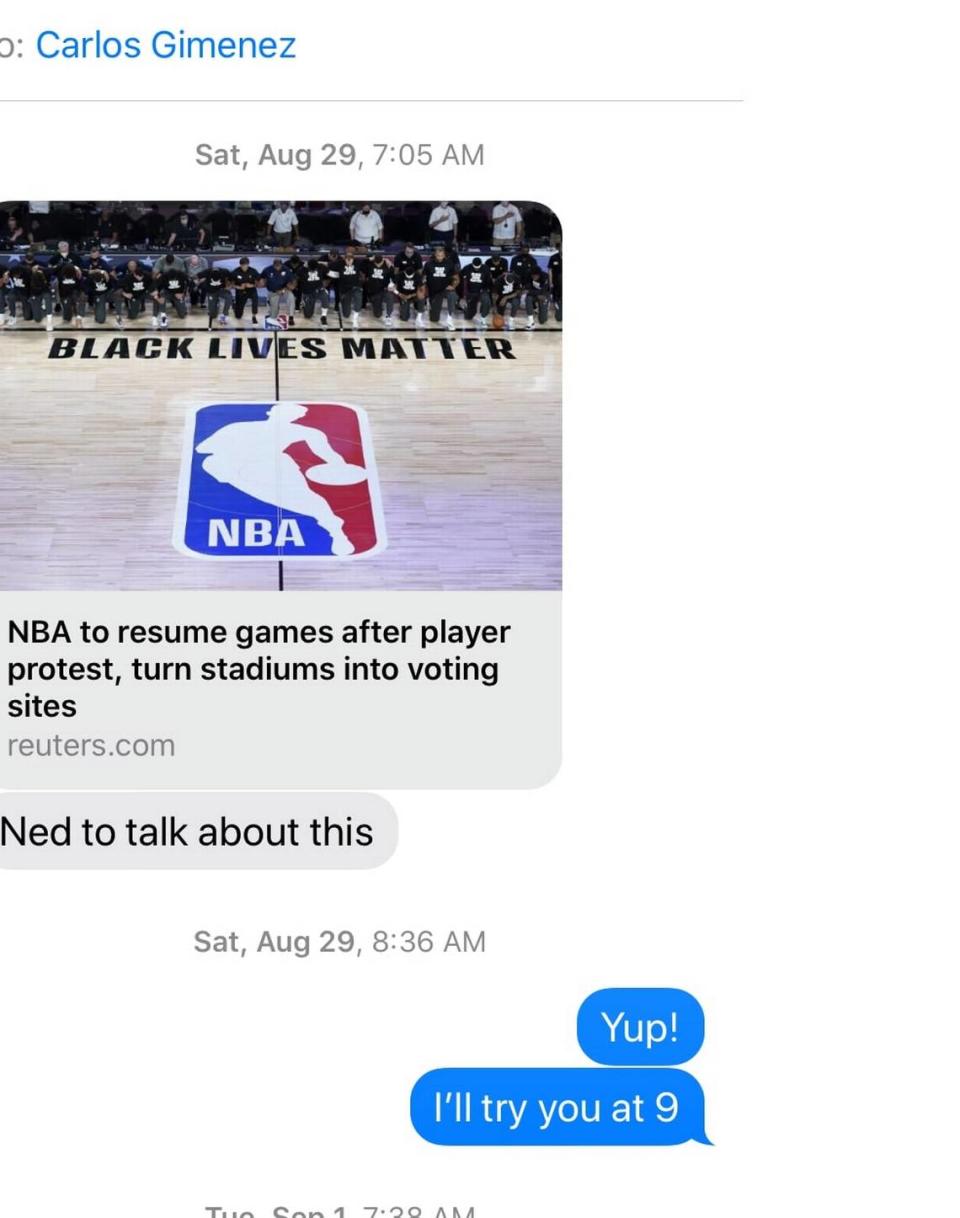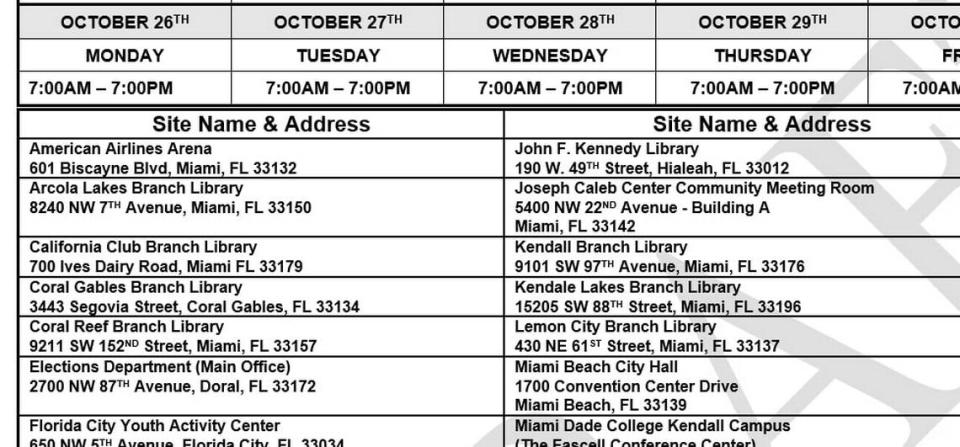How the Gimenez administration halted plans for early voting at the Heat’s AA Arena
The Miami Heat’s push to bring voting to AmericanAirlines Arena was going so well with the county’s Elections Department that it was on a draft list of polling places and in the computer system as downtown Miami’s designated early-voting site.
The next day, the county’s elections supervisor received a text from her boss, Mayor Carlos Gimenez.
On Aug. 29, Gimenez, Republican candidate for Congress, texted county election supervisor Christina White a Reuters story with the headline, “NBA to resume games after player protest, turn stadiums into voting sites.” Gimenez wrote White that they need to “talk about this.”
After that, White stopped responding to emails from the Heat about a pending polling-place agreement. Six days later, Miami-Dade announced it was using a 1,200-square-foot side room at the nearby Frost Science Museum for its downtown site in large part because it sits next to a Metromover station.

Gimenez issued a statement Sept. 4 saying he “fully supports” the choice of the Elections Department to go with Frost, “based on its accessibility and experience with early voting” since the museum’s old site in Coconut Grove was a longtime polling location. Another issue the county cited was long-term voter habits, since the return of the regular NBA fall season would overlap with future general elections.
Once the internal communication became public last week, the Gimenez administration revealed a new factor: political messaging. Jennifer Moon, the Gimenez deputy mayor overseeing the Elections Department, said the administration had concerns about the arena serving as an “apolitical” site.
“Polling places are supposed to be apolitical,” Moon said, adding Black Lives Matter wasn’t the specific cause of concern. “That was part of the discussion. Would it be an apolitical site?... I think we couldn’t conclude it would be completely apolitical. We don’t have control over the entire building.”
Black Lives Matter banner an issue?
In email exchanges in late August with Heat executive Nicholas Martinez, White wrote “the Heat may not have any advertisements in the early voting area marketing any product, supporting any political position, or seeking any act by the voters.”
Since the summer, the arena has displayed a “Black Lives Matter” banner outside, facing Biscayne Boulevard. A Heat executive said last week the sign appeared to be a county concern.
“Not specifically, although it fell under our conversation about ‘advertising,’” said Lorrie-Ann Diaz, head of business communications for the team’s front office. “But it was implied.”
Stephen Hunter Johnson, a lawyer and chairman of the county’s Black Affairs Advisory Board, called it offensive to consider “Black Lives Matter” a political statement.
“It’s as political as ‘Breast Cancer Awareness’ is political,” said Hunter, a partner at Lydecker Diaz in Miami. “It’s political by people who want to make it politicized. It’s merely a statement of acknowledging the human rights that all people enjoy.”
With players cloistered at Walt Disney World for the season under COVID precautions, the NBA used its empty arenas to address racial-justice protests that followed the May killing by police of George Floyd in Minneapolis. NBA franchises offered arenas as spacious options for voting sites, and the league linked the facilities with a campaign to boost voter enthusiasm.
The county’s September decision prompted a scathing response from the Heat, suggesting it was part of an effort to “quiet our voice on the importance of voting.”
Mucarsel-Powell: Gimenez is ‘suppressing’ voting
Gimenez’s Democratic congressional opponent in Florida’s 26th Congressional district, Rep. Debbie Mucarsel-Powell, called a press conference Saturday to condemn the mayor’s role in the AA Arena decision as “a page from Donald Trump’s playbook” and demanded Gimenez recuse himself from actions involving the Elections Department.
“Carlos Gimenez abused his power as mayor to suppress voter participation,” she said outside the Westchester library early-voting site on Saturday. “He was suppressing the vote.”
Gimenez did not respond, but said on a television appearance Sunday that Mucarsel-Powell’s allegations may have justified concerns about the political implications of opening up the arena to voters.
Gimenez: ‘Early voting site shouldn’t be political’
“If there were concerns about it becoming political, I think yesterday’s narrative from my opponent just proved our point,” he said on WPLG’s “This Week in South Florida” program. “That it was becoming way too political...An early-voting site shouldn’t be political.”
The two candidates running to replace Gimenez as mayor took opposing views on the controversy.
Mayoral candidate Daniella Levine Cava, a Democrat and Mucarsel-Powell ally, joined the congresswoman at the early voting site at the Westchester library. “It would have been a terrific space. It brings with it the enthusiasm and momentum of a great team,” she told reporters. “And our mayor suppressed it. I’m so disappointed.”
The arena sits in the heart of a commission district that is 63% Democratic. It’s also miles from the 26th Congressional District, though early-voting sites are open to all Miami-Dade voters.
Also at the Westchester library, mayoral candidate Esteban “Steve” Bovo Jr. said the problem comes when a potential polling places become political “by hanging — by basically making itself political, it’s problematic.”
He said the arena’s “Black Lives Matter” sign, which is still hanging, should be considered a political message. “It’s become a political statement, hasn’t it?” said Bovo, a Republican in the non-partisan mayoral race. “If you had a banner that was hanging that said ‘All Lives Matter’ or ‘Blue Lives Matter,” it makes it political. These places are supposed to be agnostic.”
The emails requested by the Miami Herald in September were released Friday after writer and activist Grant Stern sued the county over a similar request for records related to the arena decision.
Represented by the National Election Defense Coalition, the Stern suit against the Elections Department described the Sept. 8 request as an effort to discover why the county rejected the Heat’s arena offer for the “less suitable” Frost site. The suit claimed Elections was illegally withholding public records that could shed light on the question.
Minutes before a scheduled 4 p.m. Friday hearing in Miami-Dade Circuit Court, the Elections Department released the records related to the Herald’s Sept. 8 request. The agency also turned over records to Stern on Friday.
Frost site has issues: elections department
In June, the Elections Department was hunting for a replacement for the agency’s normal downtown polling place, the Arsht Center, as its parking lots were tied up from nearby highway construction. Two options were Arsht and Frost, and Frost had some issues.
A July 9 email from Miriam Rivero, the county’s early voting manager, said the ground-floor 1,200-square-foot space offered by the museum wouldn’t accommodate the same setup that’s deployed at the Arsht under the need for spaced-out voting during the COVID pandemic.
“If we are only going to use 1,200 sq feet, we would need to scale back the quantity of equipment assigned,” Rivero wrote White.
Emails show the Heat eager to offer its spacious 21,000-seat arena for early voting. The county-owned arena was empty at the time, with all NBA players competing in isolation at Walt Disney World during the league’s COVID-altered season in the “bubble.”
“Given the interest in Tuesday’s election and the public’s continued attention on the Presidential race, we are more confident that the Arena can be an early voting super-center that caters to the voter first,” Heat executive Martinez wrote White on Aug. 26.
White and her staff were interested. They toured the arena. White told Martinez in an Aug. 21 email that “we have the Frost Museum already confirmed as our site for that area,” but she laid out requirements for ensuring “impartiality” at the arena should the county use that site.
The “Heat may not have any advertisements in the early voting area marketing any product, supporting any political position, or seeking any act by the voters at the location,” White wrote.
Five days later, on Aug. 26, Martinez wrote back with the Heat’s answer: The “conditions you outlined are acceptable to us.”
White forwarded the email to Moon that evening. Moon responded: “I will discuss with the Mayor ASAP.”
In the Elections Department, mid-level managers were making arrangements to bring early voting to the arena. On Aug. 28, the arena appeared on a draft list of 33 early voting sites an Elections staff member shared by email. The Frost site did not make the list.
That day, White sent Martinez an email outlining some more restrictions. That included a no-fee rental of the facility, and an agreement the polling place would not be “’hosted’ or ‘sponsored’ by the HEAT Group....” White said she’d send the agreement to Martinez “once approved on our end.”

“If acceptable, we can proceed with the final details,” White wrote.
Elections Dept. added Miami Heat arena to early voting list
The next day, Xavier Pichs, an early-voting supervisor working on a Saturday, sent a request to update the department’s computerized list of polling places. “Can you please add Site #57 as AmericanAirlines Arena located at 601 Biscayne Blvd, Miami FL 33132. Management will be providing the contact for this location,” Pichs wrote in the Aug. 29 email.
That was the same morning Gimenez sent his text message to White. After that, the Heat’s emails show no responses. The following Monday, Martinez emailed White asking about the outstanding agreement. There’s no record of a response.
Later that Monday, a secretary at the Elections Department emailed White about a call from Martinez: “He says he sent you an email and to please call him back.”
At the time, White still had to check in with Gimenez on the matter. A text from her to Gimenez the following day, on Tuesday, Sept. 1, included an Orlando Sentinel article announcing plans to open up the Magic’s NBA arena for voting. “Is it possible to chat for 5 before the day gets started?” White wrote.
At a press conference Monday morning, White declined to say whether the “Black Lives Matter” banner was an issue for Miami-Dade and described Frost as the right venue for early voting.
“We’re having a great voting experience there,” she said. “Lines have been short. It’s an adequate site in my view.”
Marty Keane, a Miami lawyer, voted at the Frost Museum on Sunday with his wife and he said the two were impressed at the efficiency of the staff in moving voters through the process, and disappointed by cramped quarters.
“To me, the greatest disappointment is there was no social distancing going on in there,” he said. “You just couldn’t.”
On the way home, Keane said they walked past the arena and imagined voting inside. “They could have used the concourse alone and had 10 times the space,” he said. “It seemed like a no-brainer.”

